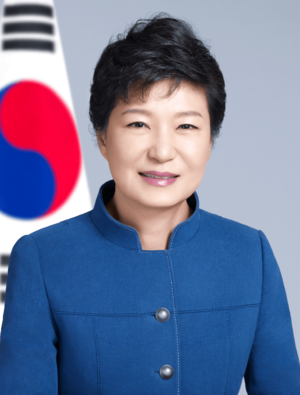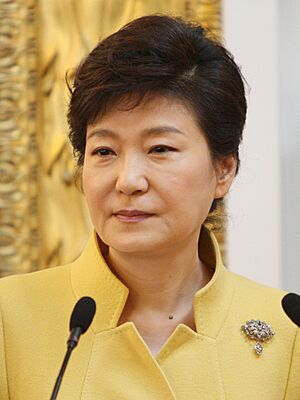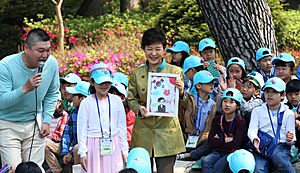Park Geun-hye facts for kids
Quick facts for kids
Park Geun-hye
|
|
|---|---|
|
박근혜
|
|

Official portrait, 2013
|
|
| 11th President of South Korea | |
| In office 25 February 2013 – 10 March 2017 |
|
| Prime Minister |
|
| Preceded by | Lee Myung-bak |
| Succeeded by | Hwang Kyo-ahn (acting) Moon Jae-in |
| First Lady of South Korea | |
| Acting 15 August 1974 – 26 October 1979 |
|
| President | Park Chung Hee |
| Preceded by | Yuk Young-soo |
| Succeeded by | Hong Gi |
| Leader of the Grand National Party | |
| In office 23 March 2004 – 15 June 2006 |
|
| Preceded by | Choi Byung-ryeol |
| Succeeded by | Kim Yeong-seon (acting) |
| Leader of the Saenuri Party | |
| In office 19 December 2011 – 15 May 2012 |
|
| Preceded by | Hwang Woo-yea (acting) |
| Succeeded by | Hwang Woo-yea |
| Member of the National Assembly | |
| In office 3 April 1998 – 29 May 2012 |
|
| Preceded by | Kim Suk-won |
| Succeeded by | Lee Jong-jin |
| Constituency | Dalseong (Daegu) |
| In office 30 May 2012 – 10 December 2012 |
|
| Constituency | Proportional representation |
| Personal details | |
| Born | 2 February 1952 Daegu, South Korea |
| Political party | Independent (since 2017) |
| Other political affiliations |
|
| Parents |
|
| Residences | Seoul, South Korea |
| Alma mater | Sogang University (BS) |
| Signature | |
| Korean name | |
| Hangul |
박근혜
|
| Hanja |
朴槿惠
|
| RR | Bak Geunhye |
| MR | Pak Kŭnhye |
Park Geun-hye (born February 2, 1952) is a South Korean politician who was the 11th president of South Korea. She served from 2013 until she was removed from office in 2017.
Park was the first woman to be elected president of South Korea. She was also the first female head of state to be elected by popular vote in East Asia. Her father, Park Chung Hee, was also a president of South Korea, serving from 1963 to 1979. After her mother died, Park served as the nation's First Lady until her father's death in 1979.
Before becoming president, Park was a leader of the conservative Grand National Party. She was also a member of the National Assembly, which is South Korea's main law-making body, for four terms. In 2013 and 2014, Forbes magazine named her one of the most powerful women in the world.
On December 9, 2016, the National Assembly voted to impeach Park. This meant they officially accused her of serious wrongdoing related to a scandal involving a close friend. The Constitutional Court of Korea agreed with the decision on March 10, 2017, and she was removed from her position as president. She was the first president in South Korea's history to be removed from office this way.
Afterward, she faced legal troubles and was sent to prison. In December 2021, she was officially pardoned and released from prison.
Contents
Early Life and Family
Park Geun-hye was born on February 2, 1952, in Daegu, South Korea. She was the first child of Park Chung Hee and Yuk Young-soo. Her father became the third president of South Korea in 1963. She has a younger brother and sister, and an older half-sister.
In 1953, her family moved to Seoul, the capital city. She graduated from high school in 1970 and earned a degree in electronic engineering from Sogang University in 1974. She also studied for a short time in France.
Tragedy struck her family twice. Her mother was killed in 1974 during an attempt to assassinate her father. After her mother's death, Park took on the duties of the First Lady. Then, in 1979, her father was assassinated by his own intelligence chief.
Political Career
Becoming a Politician
In 1998, Park was elected to the National Assembly, representing a district in Daegu. She was re-elected three more times. Because she was very successful in helping her party win elections, she earned the nickname "Queen of Elections."
In 2006, during a campaign event, a man attacked her, leaving a scar on her face that needed 60 stitches. Even after the attack, she continued her work.
Park wanted to become president in 2007 but lost her party's nomination to Lee Myung-bak. She remained an important figure in her party, which later changed its name to the Saenuri Party. In 2012, she led her party to a surprise victory in the general election.
2012 Presidential Election
On July 10, 2012, Park officially announced she was running for president. She promised to create a "democratic economy" and improve the lives of the Korean people.
Her main opponents were Moon Jae-in of the Democratic Party and Ahn Cheol-soo, an independent candidate. The race was very close. On December 19, 2012, Park won the election with 51.6% of the vote, becoming South Korea's first female president.
Presidency (2013–2017)
Park Geun-hye became president on February 25, 2013. In her first speech, she talked about bringing a "new era of hope and happiness." She wanted to focus on a strong economy, the happiness of the people, and peace with North Korea.
Key Policies
One of her main goals was to build a "Creative Economy." This plan aimed to create new jobs by supporting science, technology, and new ideas. She also focused on social issues, creating a plan to stop problems like school violence and unsafe food.
Foreign Relations
Park worked to keep a strong relationship with the United States. In May 2013, she visited the U.S. and met with President Barack Obama. She also spoke to the U.S. Congress, calling for a strong stand against any threats from North Korea.
She also built closer ties with China. In June 2013, she visited China and met with President Xi Jinping. She also met with Russian President Vladimir Putin to discuss working together on economic projects.
North Korea
Dealing with North Korea was a major challenge. Soon after she took office, North Korea conducted a nuclear test and made threats. Park's government stood firm and worked with other countries like the U.S. and China to put pressure on North Korea.
She proposed a "Trust-building Process" for the Korean Peninsula. Her goal was to build trust slowly through small projects and humanitarian aid, hoping it would lead to peace and one day, the reunification of North and South Korea.
Sinking of the MV Sewol
In April 2014, a ferry called the MV Sewol sank, causing the deaths of over 300 people, most of whom were high school students. The government's slow response to the disaster was heavily criticized. In response, Park announced a plan to reorganize the country's coast guard and emergency services. The event caused her popularity to drop.
Impeachment and Removal from Office
In late 2016, a major political scandal emerged. Park was accused of allowing her close friend, Choi Soon-sil, who had no official government position, to have too much influence over important state affairs.
Millions of South Koreans protested in the streets, demanding that she step down. On December 9, 2016, the National Assembly voted to impeach her. This meant her presidential powers were suspended while the Constitutional Court reviewed the case.
On March 10, 2017, the court voted to remove her from office permanently. She became the first president in South Korean history to be removed by impeachment.
Life After the Presidency
After being removed from office, Park was arrested. In 2018, she was found guilty on several charges and sentenced to prison.
On December 24, 2021, President Moon Jae-in announced that he was pardoning Park, mainly because of her poor health. She was released from prison on December 31, 2021. In May 2022, she attended the inauguration of the new president, Yoon Suk-yeol.
Honours
 South Korea: Recipient of the Grand Order of Mugunghwa (the highest honor in South Korea)
South Korea: Recipient of the Grand Order of Mugunghwa (the highest honor in South Korea) United Kingdom: Honorary Dame Grand Cross of the Order of the Bath
United Kingdom: Honorary Dame Grand Cross of the Order of the Bath
See also
 In Spanish: Park Geun-hye para niños
In Spanish: Park Geun-hye para niños
- Politics of South Korea
- President of South Korea
 | Chris Smalls |
 | Fred Hampton |
 | Ralph Abernathy |



